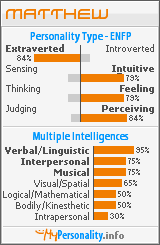Storms rock. There's the sunshine afterward to look forward to.
Wednesday, October 8, 2008
Words of the Prosecution II
Preparation is the last refuge of the weak. - Prosecutor Godot
I am strictly opposed to the word 'last'. Say we have someone who is considered 'weak', and to counter this weakness for a relevant task he must perform, he earnestly prepares himself for it. Of course, in doing so, depending on the quality and quantity of that said preparation, he proportionately increases his probability of succeeding at that task. But, to reiterate, the word 'last' is inaccurate.
For purposes of simplicity, let's give our example of a 'weak' person an identity. Let's say he's a student in a JC in Singapore, and his 'weakness' happens to be being particularly lacking in academic 'strength'. He approaches his JC1 Promotional Exams. If he fails these, he gets retained. Therefore, he musters up some willpower to work towards his goal of getting promoted and to prove to others as well as himself that he is capable. Again, his studying, depending on quality and quantity, proportionately increases his chances of succeeding. But, yet again, his preparation is not his 'last' refuge.
Reflect on the strange element of the human psyche called faith. No, not the religious form. The general term 'faith' which applies to a belief that something will/might happen, against whatever odds there are. This is inextricably linked to that force which we refer to by whatever name, be it luck, fortune, fate, karma, blessing, divine preordination, divine intervention, or what have you. This is, in my opinion, more suited to be referred to as the last refuge of the 'weak', a groundless, baseless belief that an unseen intervening force MAY shift circumstances in their favour.
For a short laugh, ponder for a moment on Murphy's Law ("If something can go wrong, it definitely will."), and of course the related statement made by a witty author ("If something can go wrong, it definitely will. However, the force which seeks to make it go wrong is also trying to accomplish a task, and therefore, is also subject to the very same law. How else do you explain why things go right?")
However, whether the last refuge of the 'weak' be preparation or faith in the existence of intervening forces, it is not only the 'weak' who take solace in these things, but also undoubtedly the 'strong'. Think about it. Are not the 'strong' considered so because they are, in most cases, more prepared than their competition? And no matter how 'strong' somebody is, using the example of a student, won't the 'strong' student hope anyway that luck (or whatever you believe it to be) is on his side and he gets questions he can answer well, or hope his marker is lenient, or understanding of his answering style? After all, it remains an irrefutable, although humbling, fact that despite the level of preparation, one may screw up at any time, since no one can possibly to prepare for something 100%. In the quasi-infinite creativity of humans, teachers, bosses and people in power can always dream up new, innovative and original ways to test someone's mettle.
Therefore, the inaccuracies of the statement, in my opinion, are that
1) Faith in intervening power(s) is/are the last refuge of the 'weak'
2) This applies not only to the 'weak', but to the 'strong' as well
Furthermore, if you had bothered to notice, I have been putting inverted commas on most of the word 'weak' and its respective word forms. This is, unarguably, because ideas of weakness and strength are relative. Hence, the whole statement, if seen this way, is either completely inaccurate or lacking in depth.
If we think of it this way, Prosecutor Godot is wrong, then.

